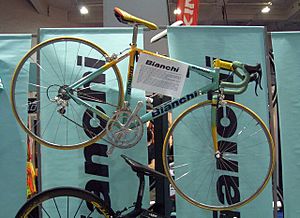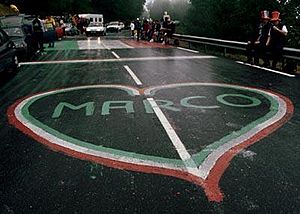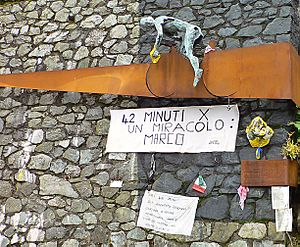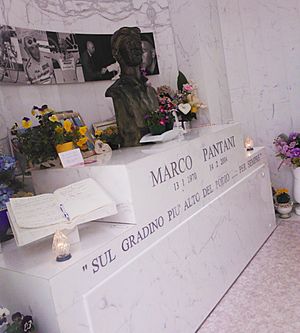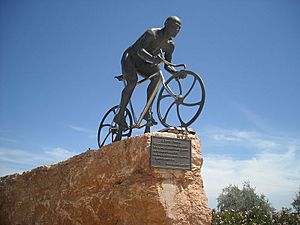Marco Pantani facts for kids

Pantani climbing Alpe d'Huez in 1997
|
|||
| Personal information | |||
|---|---|---|---|
| Full name | Marco Pantani | ||
| Nickname | Il Pirata ("The Pirate"), Elefantino ("The Little Elephant") | ||
| Born | 13 January 1970 Cesena, Emilia-Romagna, Italy |
||
| Died | 14 February 2004 (aged 34) Rimini, Emilia-Romagna, Italy |
||
| Height | 1.72 m (5 ft 7+1⁄2 in) | ||
| Weight | 57 kg (126 lb; 9 st 0 lb) | ||
| Team information | |||
| Discipline | Road | ||
| Role | Rider | ||
| Rider type | Climber | ||
| Major wins | |||
|
|||
Marco Pantani (born January 13, 1970 – died February 14, 2004) was an Italian road racing cyclist. Many people consider him one of the best climbers in cycling history. He holds records for the fastest climbs up famous mountains like Mont Ventoux and Alpe d'Huez. Even famous cyclists like Lance Armstrong admired his climbing skills.
Pantani was the last cyclist to win both the Tour de France and the Giro d'Italia in the same year (1998). Only seven riders have ever achieved this amazing "double" victory. He was the sixth Italian to win the Tour de France.
He was known for his unique cycling style, often standing up on his pedals when climbing. He was nicknamed "Il Pirata" (meaning "The Pirate") because he shaved his head and wore a bandana and earrings. At about 1.72 meters tall and 57 kilograms, he had the perfect body type for a mountain climber.
Sadly, Pantani's career faced challenges due to questions about his health. In the 1999 Giro d'Italia, he was removed from the race because of "irregular blood values." This caused him great sadness and affected his well-being, leading to a severe depression. He passed away in 2004.
Contents
Marco Pantani's Early Life
Marco Pantani was born on January 13, 1970, in Cesena, Italy. He started cycling at a young age, joining the Fausto Coppi cycling club when he was just eleven years old. As a young amateur rider, he showed great promise. He won the 1992 Girobio, which is the amateur version of the Giro d'Italia. Before that, he had finished third in 1990 and second in 1991 in the same race.
Becoming a Professional Cyclist
Starting His Professional Journey (1992–1996)
Pantani's success in the Girobio helped him become a professional cyclist in 1992. He joined the Carrera Jeans team. In his first full professional season in 1993, he rode in the 1993 Giro d'Italia. He had to leave the race early because of an injury.
In 1994, Pantani rode in the 1994 Giro d'Italia again. This time, he won two mountain stages in a row! These were his first professional victories. He finished second overall in the race, which was a fantastic achievement. Later that year, he made his first appearance in the Tour de France. He finished third overall and won the "young rider" award, which is given to the best young cyclist in the race.
In 1995, he couldn't ride the Giro because he was hit by a car while training. However, he competed in the 1995 Tour de France and won two stages in the mountains, including a famous one at Alpe d'Huez. He also earned his second "best young rider" award. Later that year, he won a bronze medal at the 1995 UCI Road World Championships. Unfortunately, he had another serious accident, colliding with a car during a race. This caused him to break his leg and miss most of the 1996 season.
Joining Mercatone Uno (1997)
After his team lost its sponsor, Marco Pantani became the leader of a new team called Mercatone Uno in 1997. He returned to the Giro d'Italia that year, but another accident caused by a black cat made him get injured again.
Despite this, he came back strong for the 1997 Tour de France. He won two stages in the Alps, setting a record time for climbing Alpe d'Huez. He finished third overall in the Tour that year. His record time for the 13.8 km climb of Alpe d'Huez, set in 1995, is still the fastest ever!
Winning the Giro and Tour (1998)
The year 1998 was incredible for Pantani. He was a favorite to win the 1998 Giro d'Italia. He faced strong competitors, but he showed his amazing climbing skills. In one mountain stage, he attacked on the Marmolada climb and took the lead in the race for the first time in his career. He won the Giro d'Italia by a minute and a half over the second-place rider. He also won the "Mountains classification" for being the best climber.
After his Giro victory, Pantani competed in the 1998 Tour de France. He started slowly, losing time in the early stages. But in the mountains, he began to catch up. In the Alps, he launched an incredible attack on the Col du Galibier climb. He turned a three-minute disadvantage into a six-minute lead and went on to win the Tour de France!
Pantani became the first Italian since 1965 to win the Tour. He was also the seventh rider in history to win both the Giro and the Tour in the same year. This was a truly historic achievement.
Challenges and Later Years (1999–2003)
In 1999, Pantani was leading the 1999 Giro d'Italia and had won four stages. However, a blood test showed "irregular blood values," and he was removed from the race for "health reasons." This was a very difficult time for him and his team.
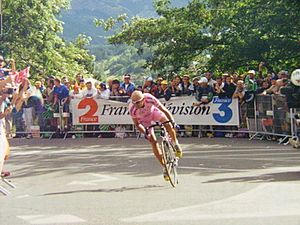
He returned to racing in 2000, including the 2000 Tour de France. He showed flashes of his old brilliance, matching Lance Armstrong on the famous Mont Ventoux climb. He also won another stage, which turned out to be his last professional victory. After this, he faced more health challenges and struggled with sadness, which affected his racing. He raced less often in 2001 and 2002.
In 2003, Pantani made another comeback in the 2003 Giro d'Italia, finishing 14th overall. This was his last professional cycling race.
Marco Pantani's Passing
On February 14, 2004, Marco Pantani was found dead at a hotel in Rimini, Italy. He was buried in his hometown of Cesenatico. Thousands of people, including many famous athletes, attended his funeral to pay their respects.
Marco Pantani's Legacy
Even after his passing, Marco Pantani remains a beloved figure in cycling. Many articles, books, songs, and even films have been made about his life. His mother, Tonina Pantani, wrote a book about him called He Was My Son.
To honor his memory, a race called the Memorial Marco Pantani is held every year. It starts in his hometown of Cesenatico. The organisers of the Giro d'Italia also dedicate a mountain pass to Pantani's memory each year. The Mortirolo Pass, a mountain where Pantani made a famous attack in 1994, was the first "Cima Pantani" (Pantani Peak) in 2004.
Many monuments and memorials have been built in his honor in places like the Mortirolo Pass, Colle Fauniera, Col du Galibier, and his hometown. These memorials remind everyone of his incredible talent and his impact on the world of cycling.
Career Highlights
Major Results
- 1990
- 3rd Overall Girobio
- 1991
- 1st Gran Premio di Poggiana
- 2nd Overall Girobio
- 1st Stage 10
- 1992
- 1st
 Overall Girobio
Overall Girobio
- 1st Stages 9 & 10
- 3rd Memorial Gastone Nencini
- 1993
- 5th Overall Giro del Trentino
- 1994
- 2nd Overall Giro d'Italia
- 1st Stages 14 & 15
- 3rd Overall Tour de France
- 4th Overall Giro del Trentino
- 4th Giro di Toscana
- 1995
- Tour de France
- 1st Stage 8 Tour de Suisse
- 3rd
 Road race, UCI Road World Championships
Road race, UCI Road World Championships - 3rd Polynormande
- 5th Giro dell'Appennino
- 6th Subida a Urkiola
- 7th Gran Premio Città di Camaiore
- 1997
- 1st Rominger Classic
- 2nd Overall À travers Lausanne
- 3rd Overall Tour de France
- 1st Stages 13 & 15
- 3rd Overall Tour of the Basque Country
- 1st Stage 5b
- 4th Overall Critérium International
- 5th La Flèche Wallonne
- 8th Liège–Bastogne–Liège
- 10th Overall Setmana Catalana de Ciclisme
- 1998
- 1st
 Overall Tour de France
Overall Tour de France
- 1st Stages 11 & 15
- 1st
 Overall Giro d'Italia
Overall Giro d'Italia
- 1st
 Overall À travers Lausanne
Overall À travers Lausanne
- 1st Stages 1 (ITT) & 2
- 1st Rominger Classic
- 1st Boucles de l'Aulne
- 3rd Overall Vuelta a Murcia
- 4th Overall Giro del Trentino
- 1999
- 1st
 Overall Vuelta a Murcia
Overall Vuelta a Murcia
- 1st Stage 4
- Giro d'Italia
- 1st Stages 8, 15, 19 & 20
- 1st Stage 2 Setmana Catalana de Ciclisme
- 3rd Overall Giro del Trentino
- 8th Clásica de Almería
- 8th Overall Tour of the Basque Country
- 2000
- Tour de France
- 1st Stages 12 & 15
- 2003
- 10th Overall Settimana Internazionale di Coppi e Bartali
Grand Tour Results
| Grand Tour | 1993 | 1994 | 1995 | 1996 | 1997 | 1998 | 1999 | 2000 | 2001 | 2002 | 2003 |
|---|---|---|---|---|---|---|---|---|---|---|---|
| DNF | 2 | — | — | DNF | 1 | DNF | 28 | DNF | DNF | 14 | |
| — | 3 | 13 | — | 3 | 1 | — | DNF | — | — | — | |
| — | — | DNF | — | — | — | — | — | DNF | — | — |
| — | Did not compete |
|---|---|
| DNF | Did not finish |
Awards
- Vélo d'Or: 1998
See Also
 In Spanish: Marco Pantani para niños
In Spanish: Marco Pantani para niños
 | Mary Eliza Mahoney |
 | Susie King Taylor |
 | Ida Gray |
 | Eliza Ann Grier |


